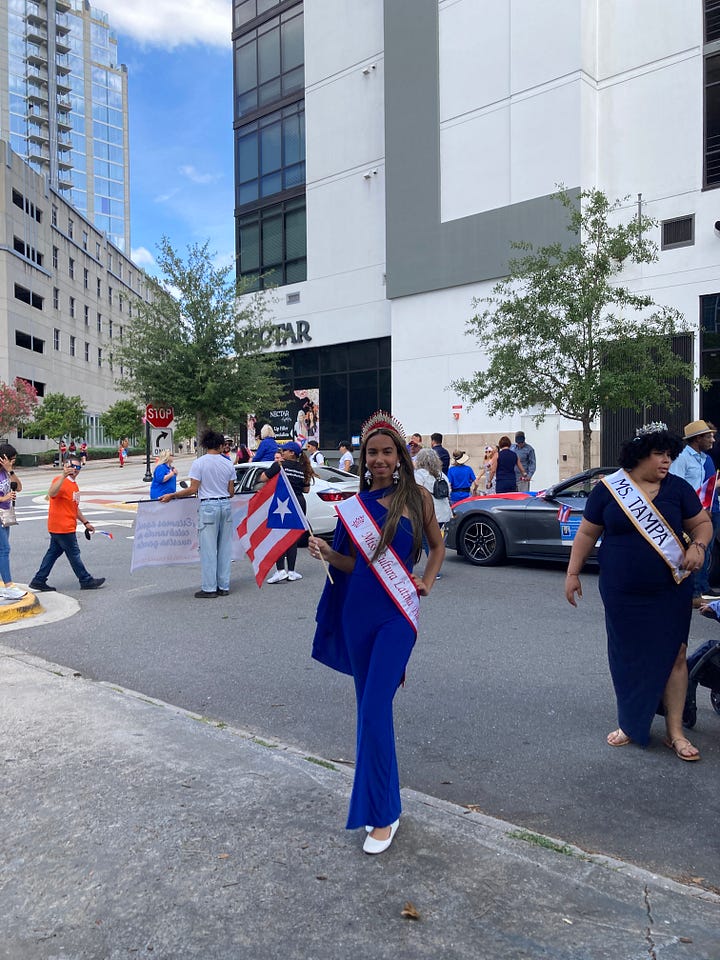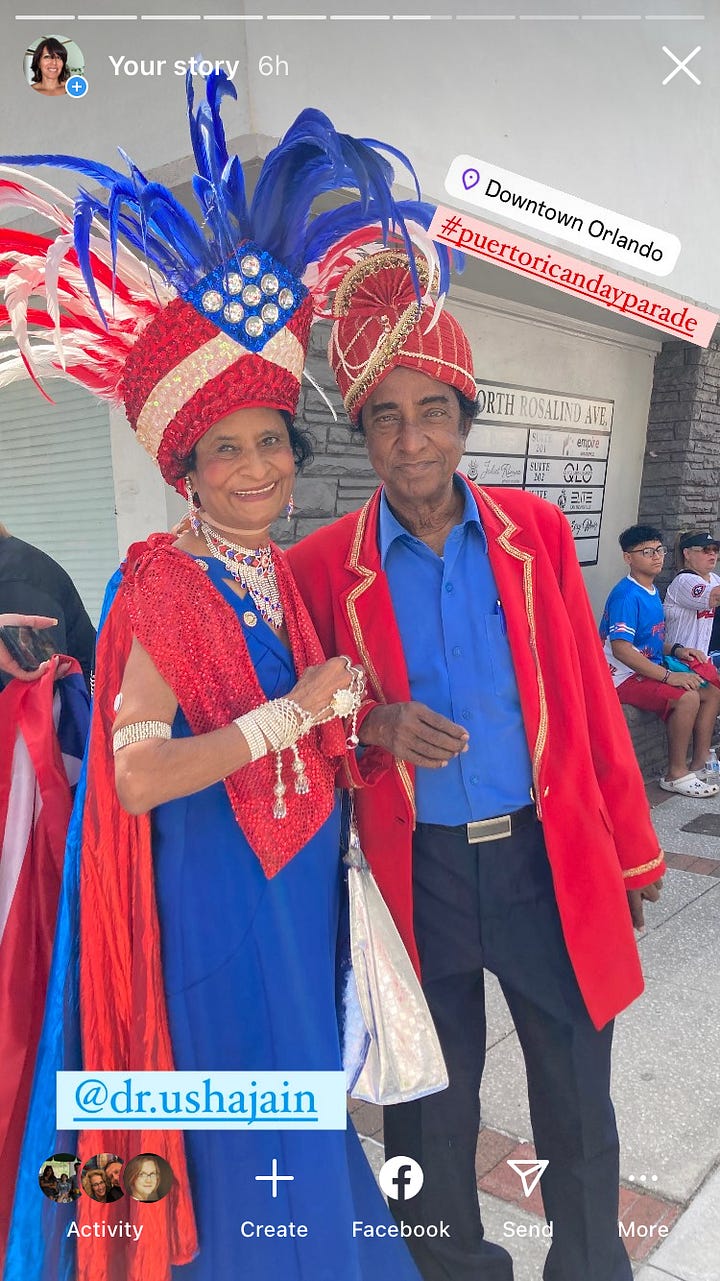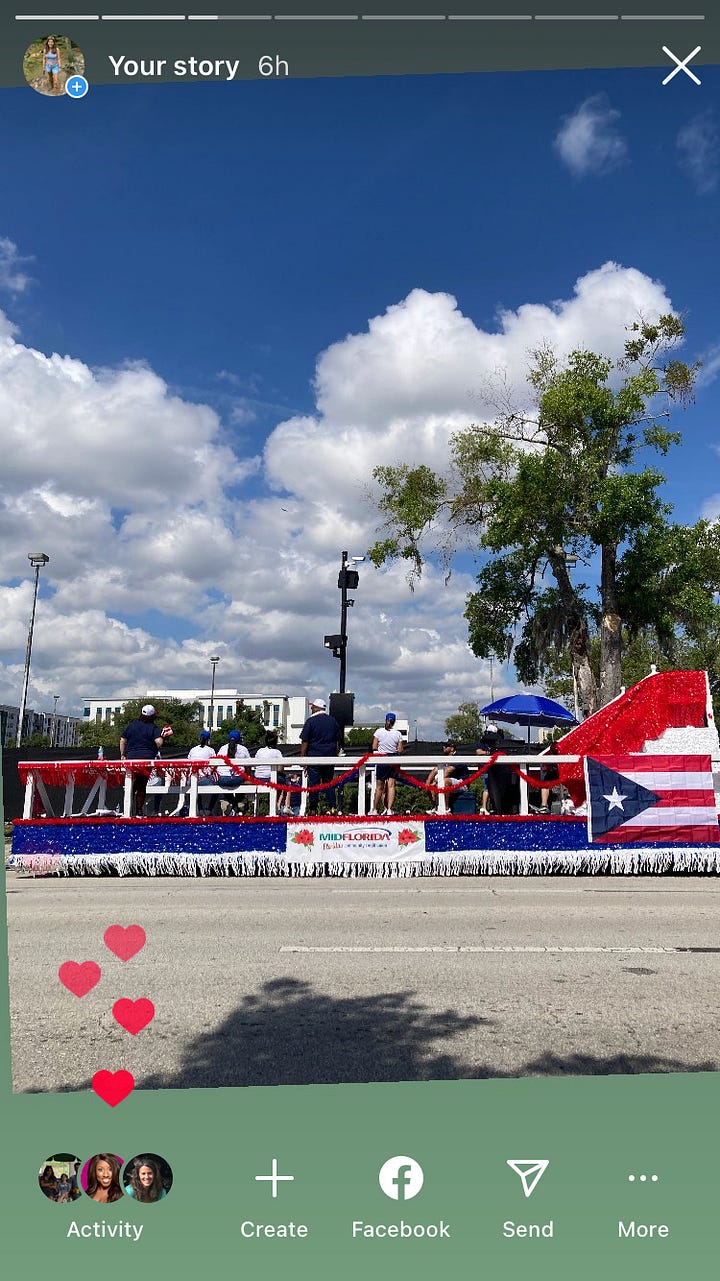The Mickey Ricans Parade of Orlando
Dr. Nutmeg chats with FIU Prof. Jorge Duany about Central Florida’s changing demographics while contemplating her own identities from Puerto Rican to Nuyorican to Mickey Rican.
Welcome back to the FACTory! I’m Dr. Nutmeg, your hostess, and today we’re bringing you coverage of the April 27, 2024 Orlando Puerto Rican Day Parade, aka “The Mickey Rican Parade!”




What the heck is a “Mickey Rican?” Bueno — If you were born and raised in New York but your parents originally came from Puerto Rico, you know that you are Nuyorican (whether you like that label or not).
If you were born and raised in Puerto Rico, you know who you are — no debate about that. But what if your roots come from the island, and you got re-planted to Pennsylvania, Connecticut, or Orlando? According to some researchers, you are a "DiaspoRican” or a “Mickey Rican” if you’re in Orlando. Cute, right?
FIU Professor Jorge Duany, author of "Mickey Ricans? The Recent Puerto Rican Diaspora to Florida," does not use the term “Mickey Ricans” anymore, but he has been documenting the incremental growth of this demographic since the 1980s. See his most recent report here.
I happened to discover Prof. Duany’s work while researching this boom for Model Ricans, the origin story of me, aka, Dr. Nutmeg and my Femmebots. Because my memory files often get deleted or scrambled, I had forgotten that duh, I literally wrote an article about Latinos in Central Florida for Latino-dot-com — archive.org doesn’t have a decent snapshot for Feb. 2000 so see the printed article below:
And then last Fall, when I was attending the Grace Hopper Conference here in Orlando with the Latinas in Data, and market researching for a TV show about Latinas working in tech, I decided to email Prof. Duany and ask him for an interview. To my surprise he responded immediately and helped me cull the latest Census data, which describes the path of my family, and many others, from Puerto Rico to New York to Orlando.
Watch Prof. Jorge Duany Describe Demographic Shifts in Central Florida
While Prof. Duany no longer uses the term “Mickey Rican” to describe Orlando's Puerto Rican Diaspora, I kinda like it, and so do some of the Latinas I've asked. What do you think?
Below are more of Dr. Nutmeg’s Turing Test questions for Prof. Duany, and then scroll down to read about Dr. Nutmeg’s confusing search for identity…
How has the process of integration and assimilation of Puerto Ricans into Florida's culture and society been?
Prof. Duany: I don't like the term assimilation. It implies people become American and forget their roots. I went to Orlando a few years ago, and had a meeting with the PR Orlando chamber of commerce. A very large number of small businesses are owned by Puerto Ricans. Culturally speaking, Puerto Ricans are blending their culture of origin from the island or parts of the U.S. with practices and customs that are different and new: food, religion, music, and that process is important to recognize like in NY public assertions of identity like parade, bomba and plena dance groups, maintenance of Spanish language thru Spanish language media, bilingual schools, churches that minister to Puerto Ricans. The question of adaptation is an interesting one, not new — other groups have gone thru the same thing.
Do Puerto Ricans in Florida still have strong ties to the island or have they diluted over time?
Prof. Duany: The island-born were very much tied to the island. I measured this by the amount of travel back to the island for Christmas, whether they were members of PR organizations, and it was very regional to specific parts of the island. One exception is Puerto Ricans don't send money home like Dominicans. I was surprised by that. Only 5% of PR population was receiving significant amount of money from family in mainland.
There are 6 million Puerto Ricans living in the U.S. so this was surprising especially with economics being so bad on the island.
2nd and 3rd generation have weaker ties and don't engage in PR status; they don't read the newspaper. There is a section in English of newspaper.
Is this because of the influx of crypto bros since Hurricane Maria in 2017?
Prof. Duany: Maybe, but many Puerto Ricans are not on the island and keeping up with the news online and in English.
What is your opinion on the future of this migration and Puerto Rican community in Florida? Will it grow, become more integrated, or dissipate?
Prof. Duany: No signs will stop anytime soon. The share of Puerto Ricans coming to Florida has expanded after the hurricane. In 2022, Orlando was the #1 destination from the island.
Within the migratory flow to Florida, what percentage would you say was made up of professionals and people with university studies?
Prof. Duany: Orlando economic opportunities are good, social networks, family connections, higher quality of life -- particularly buying a home, continuing to attract Puerto Ricans to the state of Florida.
What professional fields did this group of Puerto Rican migrants with higher education mainly come from? For example, health, education, finance, technology, etc.
Prof. Duany: PR has suffered a tremendous loss of highly skilled professionals and Florida has benefitted. I met the head doctor at Florida Health, and he was from Arecibo. That’s just one example.
Do you think Florida has benefited from Puerto Rico’s "brain drain"? Do you think it negatively affected the island?
Prof. Duany: The term “brain drain” is problematic because it suggests people with brains are leaving and ones without are not. But when I started hearing that and reading about it in newspapers, it suggested there was higher proportion of people with PhDs coming to Florida compared to earlier periods -- this wasn't quite supported by the stats until recently. Most have been blue collar workers, factory workers, mechanics who end up working in various places in the U.S., and not from the upper class or elites of PR.
That has changed and I'm re-thinking it now.
From Nuyorican to Super Gringa to Mickey Rican
by Dr. Nutmeg
Obviously, all these labels are made up — like everything else in this world is made up! But let's just entertain, for a moment, that geography shapes a person's identity, educational status, class, religion, outlook in life, etc.
For many years, I thought I was a Puerto Rican, only to find out that I was a Nuyorican because I was born in Queens and spent the first 12 years of my life in Long Island. At least, that’s what I told people throughout my career as I moved to Michigan, Denver, San Francisco, Miami, and DC to live and work as a journalist and “Latina in Tech.”
As I mingled with other Latina populations — Tejanas, Chicanas, Xicanas, Salvadoreñas, Nicaraguenses, “the border crossed me Mexican-Americans” — there were some who questioned my “Nuyorican-ness,” especially in San Francisco when I was supposed to be representing an East Coast Latina. I didn’t have that “Rosie Perez edge” that Nuyoricans (and my mom) are known for. Maybe I wasn’t Nuyorican after all…at least not one that had been represented in media.
Like a little Dora the Explorer, I traipsed through Europe, Central America, and South America, where people didn’t know what “Latina” or “Nuyorican” was. As a result, I started calling myself “Super Gringa” because they saw me as “Just American.”
TBH, I didn’t know anymore what I was cuz my geography was constantly changing…
Until I returned to Orlando in 2019.
Orlando is where I attended both middle school and high school. I was a “Minority” with a capital M. Puerto Ricans were relegated to a specific hallway — THE PUERTO RICAN HALLWAY — which I often avoided cuz I didn’t want the boys to oogle me (I preferred the white male gaze because it was clear they were the ones with the POWer…ugh).
Anyways….upon returning, and after seeing so much of the world, including Puerto Rico and New York, I was shocked to find out there was an official Puerto Rican Day Parade in Orlando like the one in New York. Whaaaat??? I was seeing myself and my family in a whole new way. I saw that our people had become a powerful demographic politically, economically, culturally, environmentally over the last 30 years.








